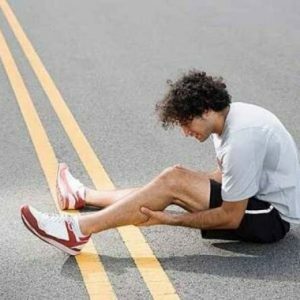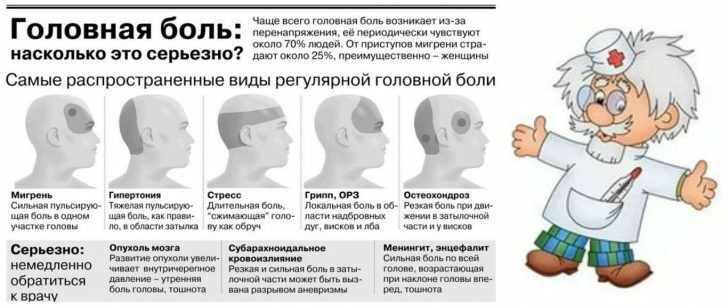Dizziness
 Vertigo is a feeling of an imaginary movement or rotation of a body in space or an incorrect definition of one's body in the surrounding space. Patients describe the dizziness completely different, it is:. Swimming or swinging head, loss of coordination, rotating inside the head, leg weakness, instability, unsteadiness when walking, etc. Dizziness is a symptom of more than eighty proven somatic and neurological diseases. In addition, this condition can be observed with cardiovascular diseases, blood diseases, mental illnesses and pathologies of the ear and eye. Dizziness - an extremely unpleasant subjective symptoms significantly reduce quality of life
Vertigo is a feeling of an imaginary movement or rotation of a body in space or an incorrect definition of one's body in the surrounding space. Patients describe the dizziness completely different, it is:. Swimming or swinging head, loss of coordination, rotating inside the head, leg weakness, instability, unsteadiness when walking, etc. Dizziness is a symptom of more than eighty proven somatic and neurological diseases. In addition, this condition can be observed with cardiovascular diseases, blood diseases, mental illnesses and pathologies of the ear and eye. Dizziness - an extremely unpleasant subjective symptoms significantly reduce quality of life
Dizziness - Causes
balance control function depends on the surface-sensory, proprioceptive, vestibular and visual information and is very complex a unique mechanism, which is called the vestibular system. All incoming sensory information is processed in the central nervous system and modeled by the activity of the extrapyramidal system, the reticular formation, the cerebellum, and the cerebral cortex. At the same time, the vestibular receptors control the position of the head, determine the change in the force of gravity, change the angular and linear acceleration, and translate all this accumulated information into brain-processing electrical impulses.
vestibular apparatus located in the pyramid( in the petrous part) and the temporal bone in structure looks like consisting of three cavities( cochlea anterior bone, the central cavity with a spherical and elliptical pouch; vestibular rear chamber; three semicircular canal of bone) bone maze. Blood vestibular apparatus is supplied with branches of the basilar and anterior cerebral arteries, internal auditory artery. In the absence of any pathology, vestibular activity occurs at a subconscious level, with lightning recognition of any changes in the patterns of sensory influences. Not one person does not think about keeping balance for running and walking, about the position of the eyes when jumping, bending and moving the head. All this for him instantly makes the vestibular apparatus. In the event of any dysfunction of modulation, generation or integration in this complex mechanism, there is an imbalance, dizziness, and perhaps nausea and even vomiting.
In its downstream dizziness may be transient and insignificant or constant increasing symptom of the presence of a person of serious abnormalities or disorders
Causes dizziness - damaged due to the vestibular nuclei with the cerebellum, in the trunk, with the medial longitudinal fasciculus, with the cerebral cortex, musclesBody and neck, nuclei of the eye muscles, as well as pathological changes in the vestibular part of the inner ear.
There are non-systemic and systemic( true) non-system dizziness dizziness
- a sense of instability and a sense of instability of the surrounding space. This type of vertigo occurs when cerebellar and emotional disorders, lesions of the visual analyzer, with near syncope
System( true) dizziness - illusion of movement of surrounding objects or directly of the human body in the surrounding space. Systemic dizziness is accompanied by anxiety, increased sweating, blanching of the skin, nausea and vomiting. The true form is associated with the irritation of certain regions of the vestibular analyzers, and is subdivided depending on the degree of damage to the central and peripheral vertigo( dizziness).The most common reasons for the development of true dizziness: various intoxications, degenerative and inflammatory processes of the organs of balance and hearing;Disturbed blood supply to the inner ear, brain.
In the world neurological practice, dizziness occurs most often with various emotional disorders, pathologies of the cervical spine and cerebrovascular diseases of the brain
Emotional disorders . Depression , various neurotic disorders, mild overwork and malaise can mimic virtually any symptomatology of the body's disease. In some cases, the only symptom is dizziness, noise / ringing in the ear, noise in the head. In these diseases is accompanied by severe dizziness, fatigue, continuous fixation of attention to his poor health, sleep disorders and appetite, increased anxiety, combined with tearfulness and bad mood
Pathology Department cervical spine. On the shortage of blood supply, the vestibular system reacts quite sharply. The vestibular centers of the brain and the inner ear feed on blood from the vertebral artery system, which lie in the narrow canals of the cervical spine. Osteochondrosis , trauma or instability of the cervical vertebra often leads to squeezing of these arteries, which leads to a shortage of blood flow and, accordingly, dizziness. The main symptomatology for these diseases: shakiness and dizziness, which increase with tilts and turns of the head;Reduced vision in the dark, ripples and / or "flies" in the eyes;Discomfort and tension in the temples, lower back and neck;Irritability and fatigue;Accompanied by nausea, and sometimes vomiting, increased blood pressure
Vascular lesions of the brain .With these pathologies, dizziness may occur as a result of atherosclerotic lesions of the arteries, or due to hypertensive disease. With a prolonged increase in arterial pressure, the small arteries of the brain are damaged, they become inelastic and narrow. As a result of such changes, the inflow to the brain of a person enriched with oxygen( arterial) blood decreases, leading to dizziness, noise / ringing in the ears and head. Atherosclerosis is characterized by the deposition of convexity on the internal walls of arteries - plaques that gradually block the flow of blood. The most dangerous is the formation of such plaques in the arteries of the brain. In the case of cerebral circulation, vertigo is sometimes the first and only complaint of
Dizziness occurs in the following diseases and processes:
- Infectious diseases , syphilis of the temporal bone
- Ear diseases: otitis media( chronic or acute middle ear inflammation), cholesteatoma, otosclerosis,acoustic neuroma, etc.
-
Cerebrovascular disease - Traumatic brain injury, trauma
temporal bone - disease of the cerebellum: the tumor, degeneration
- ZaboEvan nervous system: Parkinson's disease, syringomyelia, multiple sclerosis
- cervical spine disease, Paget
disease - Various intoxication: drugs, mercury, drugs, industrial solvents, alcohol
- Systemic diseases: Atherosclerosis, hypertension, stroke, rheumatic fever, ischemic heart disease, anemia, malignancies , metabolic disorders,
peptic ulcer disease - Mental illness
DiaGnostic dizziness
Since the list of disease states and disorders with dizziness is truly enormous, to determine the exact cause of vestibular disorders, a comprehensive examination is required. First of all, the patient is shown the consultation of a neurologist and an otolaryngologist;If necessary, a therapist, a cardiologist, a vascular surgeon, an infectionist, and an oculist. The neurologist, in addition to an external examination for specific neurological symptoms, often assigns X-ray of the temporal bone, cervical spine, doplerography of the main vessels, CT and MRI.The otolaryngologist examines directly the auditory and vestibular apparatus. Laboratory diagnosis is purely individual and is assigned on the basis of detected somatic diseases. Dizziness is a concomitant symptom of a very large number of diseases, so very often even after comprehensive examinations, its cause remains unclear.
Dizziness - treatment of
Treatment of dizziness primarily depends on the underlying cause of the disease, and only after its diagnosis is the appropriate choice of treatment strategy. In case of occurrence of a giddiness against a proceeding somatic disease, it is necessary to treat it first of all. Antihistamines( Diprazin, Cinnarizine), Phenobarbital, Metherazine, Torekan, Diazepines, Belloid, vasodilators( nicotinic acid, Tionikol) and diuretics are prescribed. In the presence of concomitant vertigo vomiting, injection appointed Elenium or Seduxen. In the case of prolonged severe dizziness, the administration of neuroleptics( haloperidol) is indicated. To improve blood circulation, there is a reception of such vascular drugs as: Memoplant, Cavinton, Sermion
More articles on the topic:
1. Vertigo 2.
attention deficit disorder


